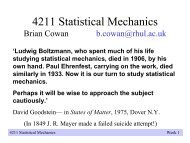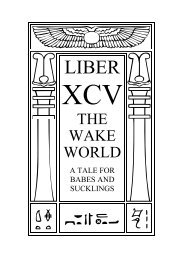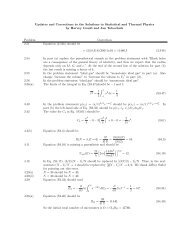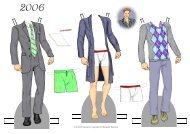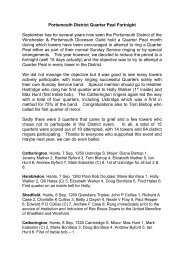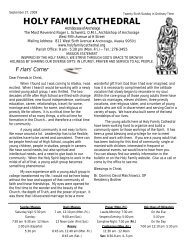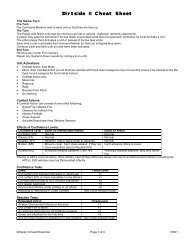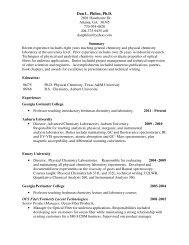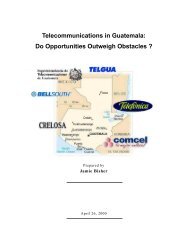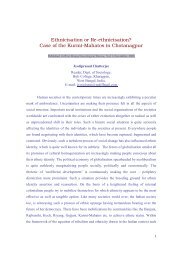A Critique of The German Ideology
A Critique of The German Ideology
A Critique of The German Ideology
You also want an ePaper? Increase the reach of your titles
YUMPU automatically turns print PDFs into web optimized ePapers that Google loves.
the ideal "compensation in the species", and thus to relapse into idealism at the very point<br />
where the communist materialist sees the necessity, and at the same time the condition, <strong>of</strong><br />
a transformation both <strong>of</strong> industry and <strong>of</strong> the social structure.<br />
As far as Feuerbach is a materialist he does not deal with history, and as far as he<br />
considers history he is not a materialist. With him materialism and history diverge<br />
completely, a fact which incidentally is already obvious from what has been said.<br />
Ruling Class and Ruling Ideas<br />
<strong>The</strong> ideas <strong>of</strong> the ruling class are in every epoch the ruling ideas, i.e. the class which is the<br />
ruling material force <strong>of</strong> society, is at the same time its ruling intellectual force. <strong>The</strong> class<br />
which has the means <strong>of</strong> material production at its disposal, has control at the same time<br />
over the means <strong>of</strong> mental production, so that thereby, generally speaking, the ideas <strong>of</strong><br />
those who lack the means <strong>of</strong> mental production are subject to it. <strong>The</strong> ruling ideas are<br />
nothing more than the ideal expression <strong>of</strong> the dominant material relationships, the<br />
dominant material relationships grasped as ideas; hence <strong>of</strong> the relationships which make<br />
the one class the ruling one, therefore, the ideas <strong>of</strong> its dominance. <strong>The</strong> individuals<br />
composing the ruling class possess among other things consciousness, and therefore<br />
think. Ins<strong>of</strong>ar, therefore, as they rule as a class and determine the extent and compass <strong>of</strong><br />
an epoch, it is self-evident that they do this in its whole range, hence among other things<br />
rule also as thinkers, as producers <strong>of</strong> ideas, and regulate the production and distribution <strong>of</strong><br />
the ideas <strong>of</strong> their age: thus their ideas are the ruling ideas <strong>of</strong> the epoch. For instance, in an<br />
age and in a country where royal power, aristocracy, and bourgeoisie are contending for<br />
mastery and where, therefore, mastery is shared, the doctrine <strong>of</strong> the separation <strong>of</strong> powers<br />
proves to be the dominant idea and is expressed as an "eternal law".<br />
<strong>The</strong> division <strong>of</strong> labour, which we already saw above as one <strong>of</strong> the chief forces <strong>of</strong> history<br />
up till now, manifests itself also in the ruling class as the division <strong>of</strong> mental and material<br />
labour, so that inside this class one part appears as the thinkers <strong>of</strong> the class (its active,<br />
conceptive ideologists, who make the perfecting <strong>of</strong> the illusion <strong>of</strong> the class about itself<br />
their chief source <strong>of</strong> livelihood), while the others' attitude to these ideas and illusions is<br />
more passive and receptive, because they are in reality the active members <strong>of</strong> this class<br />
and have less time to make up illusions and ideas about themselves. Within this class this<br />
cleavage can even develop into a certain opposition and hostility between the two parts,<br />
which, however, in the case <strong>of</strong> a practical collision, in which the class itself is<br />
endangered, automatically comes to nothing, in which case there also vanishes the<br />
semblance that the ruling ideas were not the ideas <strong>of</strong> the ruling class and had a power<br />
distinct from the power <strong>of</strong> this class. <strong>The</strong> existence <strong>of</strong> revolutionary ideas in a particular<br />
period presupposes the existence <strong>of</strong> a revolutionary class; about the premises for the latter<br />
sufficient has already been said above.



